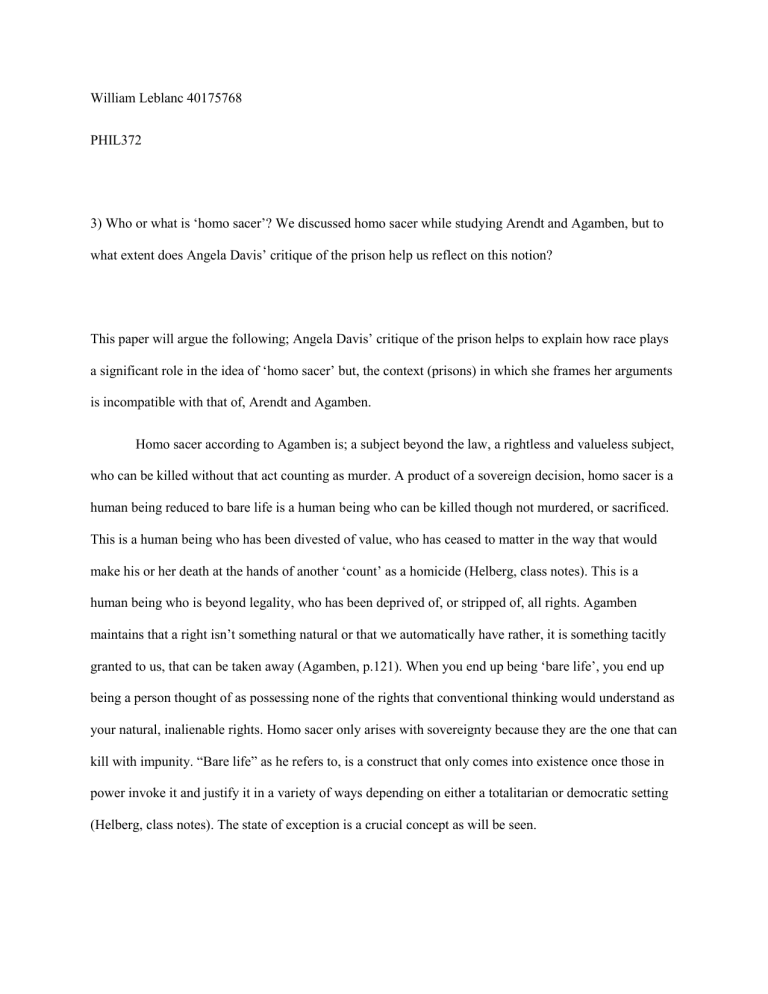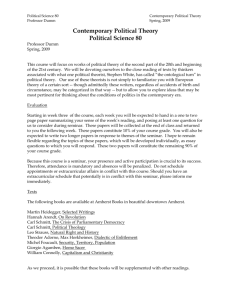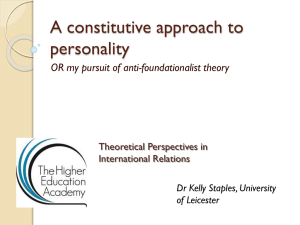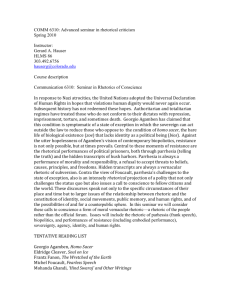
William Leblanc 40175768 PHIL372 3) Who or what is ‘homo sacer’? We discussed homo sacer while studying Arendt and Agamben, but to what extent does Angela Davis’ critique of the prison help us reflect on this notion? This paper will argue the following; Angela Davis’ critique of the prison helps to explain how race plays a significant role in the idea of ‘homo sacer’ but, the context (prisons) in which she frames her arguments is incompatible with that of, Arendt and Agamben. Homo sacer according to Agamben is; a subject beyond the law, a rightless and valueless subject, who can be killed without that act counting as murder. A product of a sovereign decision, homo sacer is a human being reduced to bare life is a human being who can be killed though not murdered, or sacrificed. This is a human being who has been divested of value, who has ceased to matter in the way that would make his or her death at the hands of another ‘count’ as a homicide (Helberg, class notes). This is a human being who is beyond legality, who has been deprived of, or stripped of, all rights. Agamben maintains that a right isn’t something natural or that we automatically have rather, it is something tacitly granted to us, that can be taken away (Agamben, p.121). When you end up being ‘bare life’, you end up being a person thought of as possessing none of the rights that conventional thinking would understand as your natural, inalienable rights. Homo sacer only arises with sovereignty because they are the one that can kill with impunity. “Bare life” as he refers to, is a construct that only comes into existence once those in power invoke it and justify it in a variety of ways depending on either a totalitarian or democratic setting (Helberg, class notes). The state of exception is a crucial concept as will be seen. Agamben establishes his own form of biopolitics by deeming sacredness as a necessary element of this social order so to speak. Homo sacer is necessary for sovereignty but can also be voluntarily removed from this very social system without any sort of repercussion. For Agamben, this is how people are reduced to life only, where death can occur without any consequences. This is obviously problematic because what meaning do the life of these people end up having? Homo sacer becomes nothing but flesh and the very liveness that occupies their mind and body is stripped from them. Agamben refers to the Holocaust, he draws a connection between sovereign power and this historical event. The Holocaust as portrayed by Agamben, is a result of a form of biopolitics because jews were reduced to bare life which is what this form of biopolitics aims to do. Arendt’s conception of the ‘stateless’ is similar to Agamben’s homo sacer by describing an individual who is rightless. Arendt’s seeks to offer her own account regarding the question as to whether human beings are supposed to have inalienable rights. Using historical examples in Europe such as the Holocaust, she perpetuates the idea that in the world, nations can strip certain people of rights and once this occurs, these people become alienated from their nation and consequently, stateless (Arendt, 267). The source which creates the stateless is the leader(s) of a totalitarian state but further, it is this notion of the ‘state of exception’. Much like Agamben, it is an ability only in which those in a position of power have. The state of exception refers to the state in which an individual is placed if they are deemed as a threat to ‘bare life’, the idea is that the sovereign sees its people as bare life and if one is deemed as a threat to the sovereign’s intentions then that person’s death can be justified. Arendt mentions how the police basically became a ruling force independent of government in the Eastern European context. Totalitarian countries, especially Germany, began working towards a framework where anyone of “alien blood” that is, second-class citizens with no rights, could be expelled. (Arendt, p.288). But even in the non-totalitarian countries, the police had increasing power to do the same thing. There were concentration camps across Europe, even if the inmates received very different treatment in different places (Arendt, p.288). With this increase in power for the police force came more challenges for the stateless, now being forced to obey to the whimsical rule of the police. Lastly, I want to touch on Arendt’s distinction between being stateless and being a criminal as it will relate significantly with the second section of this paper. Arendt argues that the best way to see if someone lives outside the law is to ask if their legal position would be improved by committing a crime. They remain an exception, but it is an exception provided for by the law. The stateless criminal is not treated worse than others; he is treated like every other criminal: “The same man who was in jail yesterday because of his mere presence in this world, who had no rights whatever and lived under threat of deportation, or who was dispatched without sentence and without trial to some kind of internment because he had tried to work and made a living, may become almost a full-fledged citizen because of a little theft. Even if he is penniless, he can now get a lawyer, complain about his jailers, and he will be listened to respectfully. He is no longer the scum of the earth but important enough to be informed of all the details of the law under which he will be tried. He has become a respectable person”. (286-287) The above quote is Arendt’s method of confirming whether or not someone has truly been deprived of rights. That is to say, the stateless individual is better off committing a crime to regain some form of legitimacy in their lives that is: protection from the law. As opposed to, being subject to the “arbitrary police rule against which there are no lawyers and no appeals” (Arendt, p.286). In sum, since the stateless lived outside all legal protections, they were subjected to jail sentences without having committed any crimes hence why, Arendt states “Since he was the anomaly for whom the general law did not provide, it was better for him to become an anomaly for which it did provide, that of the criminal.” Speaking to the above point (Arendt, p.286). To conclude this section, the takeaway from all this this is the idea that modern democracy has an inherent totalitarian control over life and death, Agamben and Arendt see it very hard to distinguish the two as a result. Although, rarely as extreme as Nazi Germany, the modern nation-state has the ability to both give and remove those very rights from its citizens. That is to say, the ability to be a totalitarian state makes you a totalitarian state. Forwardly with Davis, a strong connection can be seen between her writing and that of Agamben and Arendt, they all shine a light on the issue of race regarding the stateless or homo sacer. Davis goes to the extent that she compares prison to slavery claiming that both institutions subordinate subjects to others, make them dependent on others for basic needs, both confine and isolate people, and both force people to work basically uncompensated. They each seem to deprive people of basic rights (Davis, p.27). When put in this way, I see a significant divide between the three authors. The way I see it, prisoners, for example, are in a state of exception (e.g. no right to vote) that has become normalized and legalized, to put it bluntly. Slavery puts individuals in the same sort of state but morally speaking, slaves are not necessarily criminals like prisoners, they may have done nothing wrong to deserve the kind of treatment they receive. My point is that although treatment may be the same, it is unfair to compare a societal norm from the past such as slavery to as modern institution such as prison, something that Davis ignores based purely on what each institution achieves, the deeper trends that lead to this treatment of prisoners and the stateless are ignored by Davis. Human rights, in general and in particular for Western states, have even less legitimacy. In my opinion, national rights are the locus of all legitimate right to violence while human rights are a nice idea, they are very difficult to implement because rights are really national by definition (for citizens). Which is an underlying point I believe Agamben aims to portray through homo sacer. That is why refugees and undocumented migrants are in such a tough position. No nation really has to protect them thus, most of the time they do not. Further, homo sacer can exist outside of the prison context although many end up in prison due to being stateless. Davis makes it seem as though 1. Minorities make up a high percentage of these people. 2. She deems the solution to be about abolishing the prison system. The first point is understandable because based off my understanding of Agamben and Arendt, minorities tend to be susceptible to being rendered stateless. But the idea that prisons must be abolished because of their disregard for the rights of prisoners seems farfetched when compared to the conclusions Agamben and Arendt come to. Agamben and Arendt see it as a systematic issue that revolves around those in power this is to say that Totalitarian states are what need to be abolished. Arendt goes deeper regarding prisoners, seeing them as being close to the realm of legality (Helberg, class notes). Going back to the above regarding prisoners' rights, prisoners maintain rights according to Arendt, by being in prison they are void of all outside corruption within the police force for example. Hence why, prisoners and slaves cannot be compared, the historical context is extremely important in the sense that prisoners have always had the luxury of being protected legally whereas, slaves can be seen as being under constant authority that leaves no room for leniency. Davis’ discussion regarding super-max prisons is relevant, again she explains how these prisons are littered with Latinos and African-Americans depicting again how race is part of the bigger picture. It coincides with Arendt’s conception of the stateless but again seems to miss the main point which is that prisons are not a result of Totalitarian rule. Even in the context of super-max prisons, the point is to punish the worst criminals. These criminals are judge based on the severity of the acts they performed and not simply because of a random decision by those in power to alienate individuals from the nation-state. Arendt and Agamben agree in this sense, it is a sovereign decision to choose who will be rendered ‘bare life’, the prison system would have to be highly corrupt in order for this to be the case based on what Davis proposes. It must be taken into consideration that Davis also stresses that the basic rights that prisoners hold prior to entering prison are completely stripped once introduced to the institution. If one were to compare this with Arendt, she states that in the world there are no basic, alienable rights for humans (Helberg, class notes). Basic rights are in fact rights of citizens and once someone is rendered stateless, they are stripped of these rights. I do not see this applying to prisoners. Prisoners may be treated poorly as Davis wants to explore but the reality as Arendt states is that prisoners are ahead of the stateless in that sense. They maintain legal rights whereas, the stateless is stripped and consequently, seen as rightless in every aspect of the word on a global scale (Arendt, p.293). Davis’ argument as to whether prison is true rehabilitation is irrelevant when thinking about homo sacer. When referencing homo sacer, the focus is on rights and how the strippage of rights occurs as opposed to the treatment the individuals is subjected to. To conclude, Angela Davis uses prison reform to point out the clear issue of race regarding prisoners. Much like Agamben and Arendt, who argue that migrants and asylum-seekers are a result of a system that discriminates as seen through the Holocaust. Apart from this, Davis argues on the basis that the prison system needs to be reformed and to a certain extent, abolished. Based on what we know about homo sacer and stateless through Agamben and Arendt differs from her reasoning as to why there is a need for reform. Whether it be the rights or the treatment of prisoners, none of it falls into accordance with homo sacer. Ideally, in order for Davis’ text to be more relevant and helpful to the notion of homo sacer, she would have needed to focus on causation as opposed to results. Works Cited Agamben, Giorgio. 1998. Selections from “The Camp as Biopolitical Paradigm of the Modern.” Homo Sacer: Sovereign Power and Bare Life. Stanford: Stanford UP. 119-134;136-143; 166-180.URL Arendt, Hannah. 1973. “The Decline of the Nation-State and the End of the Rights of Man.” The Origins of Totalitarianism. New York: Harcourt Brace. 267-302.URL Davis, Angela. 2003. Are Prisons Obsolete? New York, NY: Seven Stories Press. Natalie Helberg, Class Notes. Concordia University. 2022.


